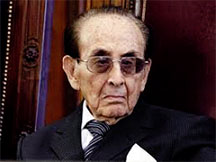BUENOS AIRES, (Reuters) – The Argentine government’s call for medical tests to evaluate a Supreme Court judge’s mental and physical health has placed the independence of the country’s judiciary under tight scrutiny for a second time this year.

The government has fiercely questioned 97-year-old Carlos Fayt’s ability to continue in his post and earlier this week a congressional committee, dominated by the ruling party and its allies, called for the judge’s health to be evaluated.
Cabinet Chief Anibal Fernandez has called the veteran judge’s recent performance poor, and publicly pressured Fayt to take the medical examinations. Fernandez suggested the veteran judge “may have lost the aptitude he once had.”
Government critics allege President Cristina Fernandez’s administration wants to replace Fayt with a judge more sympathetic to it, amid a raft of high profile graft investigations.
“Nobody is seeking to do wrong to him, nor to sanction him,” the state-run Telam news agency on Thursday quoted Cabinet Chief Anibal Fernandez as saying.
The move has drawn strong rebukes from opposition legislators and accusations of political interference in the judiciary. It comes four months after the unsolved death of a state prosecutor, the fallout from which government critics said laid bare a deep-seated culture of meddling in Argentine courts.
Fayt’s performance fell under the spotlight after it emerged he failed to attend an April meeting at which the court’s judges re-elected Justice Ricardo Lorenzetti as head of Argentina’s top tribunal.
Fayt then skipped a regular weekly meeting on Tuesday before returning to the tribunal on Wednesday to ratify Lorenzetti’s re-election.
Television pictures showed Fayt gingerly stepping out of his car with the help of two aides and leaning on a walking stick. He told reporters: “I’m doing well.”
Opposition leaders have rallied in support of Fayt.
“There is no possible democracy if there is no respect for the division of powers,” tweeted the opposition’s front-runner in October’s presidential election, Mauricio Macri, earlier in the week.
Opposition lawmaker Ricardo Buryaile on Thursday branded the government’s actions a blow to the country’s democratic institutions aimed at shielding corrupt officials from the law courts.
“While destroying a judge whose record is unblemished, the government protects criminals and supports immoral behaviour,” Buryaile said.
State prosecutor Alberto Nisman was found dead in January days after he accused President Fernandez of conspiring to cover up Iran’s alleged role in a 1994 bombing. Judges have since thrown out the case.









